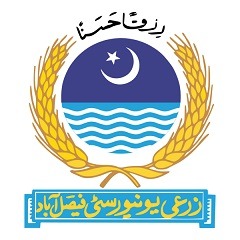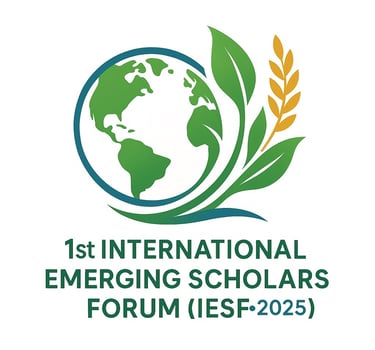1st International Emerging Scholars Forum (IESF-2025) August 20-22, 2025 Faisalabad, Pakistan


Scope of IESF-2025
The 1st International Emerging Scholars Forum (IESF) on Building Resilient Agri-Food Systems in a Climate-Vulnerable World aims to spotlight the work of early-career researchers contributing to sustainability, equity, and innovation in global agri-food systems. The forum provides a dynamic platform for exchanging ideas across key thematic areas.
It explores how economic tools and strategies can build climate resilience, including the adoption and impact assessment of climate-smart agriculture, optimization of the water-energy-food nexus, and the economics of emerging issues like microplastics. Discussions also address carbon pricing, green innovation, and ecosystem service valuation.
The forum examines agri-food system transformation under conditions of market volatility and policy shifts. This includes digital agriculture platforms, resilience of value chains, and the effects of trade liberalization. Topics such as food security, behavioral economics, and nutrition are also key areas of exploration.
In the realm of technological advancement, the forum focuses on the use of artificial intelligence, remote sensing, and blockchain for productivity, traceability, and inclusive innovation. It critically evaluates ethical concerns related to big data and emphasizes digital inclusion for smallholders.
Policy and institutional innovation form another core area, where participants will engage with themes such as land tenure reform, gender equity, labor migration, innovative subsidy mechanisms, and governance structures. There is a strong emphasis on indigenous knowledge and community-led adaptation.
Finally, the forum encourages the development and application of emerging methodologies and interdisciplinary approaches. Researchers will share work on life cycle assessments, circular bio-economy modeling, experimental research in behavioral and development economics, and mixed-methods studies that integrate economics with ecological and social dimensions.
By convening diverse voices and innovative research, the IESF seeks to foster collaboration, shape future research agendas, and inform policy dialogues that support the transition to resilient and equitable agri-food systems worldwide.
Abstract Submissions Closed


📬 Stay Connected
Subscribe to our newsletter to receive research updates, publication calls, and ambassador spotlights directly in your inbox.
🔒 We respect your privacy.
🧭 About Us
The Agricultural Economist is your weekly guide to the latest trends, research, and insights in food systems, climate resilience, rural transformation, and agri-policy.
🖋 Published by The AgEcon Frontiers (sPvt) Ltd. (TAEF) a knowledge-driven platform dedicated to advancing research, policy, and innovation in agricultural economics, food systems, environmental sustainability, and rural transformation. We connect scholars, practitioners, and policymakers to foster inclusive, evidence-based solutions for a resilient future.
The Agricultural Economist © 2024
All rights of 'The Agricultural Economist' are reserved with TAEF
